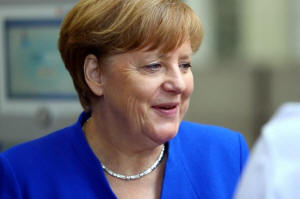|
Germany threatens retaliation if U.S.
sanctions harm its firms
 Send a link to a friend
Send a link to a friend
 [June 17, 2017]
By Gernot Heller and Alissa de Carbonnel [June 17, 2017]
By Gernot Heller and Alissa de Carbonnel
BERLIN/BRUSSELS (Reuters) - Germany
threatened on Friday to retaliate against the United States if new
sanctions on Russia being proposed by the U.S. Senate end up penalizing
German firms.
The Senate bill, approved on Thursday by a margin of 98-2, includes new
sanctions against Russia and Iran. Crucially, it foresees punitive
measures against entities that provide material support to Russia in
building energy export pipelines.
Berlin fears that could pave the way for fines against German and
European firms involved in Nord Stream 2, a project to build a pipeline
carrying Russian gas across the Baltic.
Among the European companies involved in the project are German oil and
gas group Wintershall, German energy trading firm Uniper, Royal Dutch
Shell, Austria’s OMV and France’s Engie.
German Chancellor Angela Merkel's spokesman described the Senate bill,
which must be approved by the House of Representatives and signed by
President Donald Trump before it becomes law, as "a peculiar move".
He said it was "strange" that sanctions intended to punish Russia for
alleged interference in the U.S. elections could also trigger penalties
against European companies.
"That must not happen," said the spokesman, Steffen Seibert.
In an interview with Reuters, German Economy Minister Brigitte Zypries
said Berlin would have to think about counter-measures if Trump backed
the plan.

"If he does, we'll have to consider what we are going to do against it,"
Zypries said.
The sharp response from Berlin comes at a time of deep strains in the
transatlantic relationship due to shifts in U.S. policy and a more
confrontational rhetoric towards Europe under Trump.
The new U.S. president has lambasted European partners for not
contributing more to NATO, slammed Germany for running a large trade
surplus with the United States and broken with allies on climate change
with his decision to exit the landmark Paris agreement on combating
greenhouse gas emissions.
Ironically, the part of the Senate bill that targets Russia was
introduced by some of the president's top critics, including Republican
hawk John McCain.
They are intent on limiting Trump's ability to forge warmer ties with
Russia, a key foreign policy pledge during his campaign for the
presidency, but one he has been unable to deliver on amid investigations
into alleged Russian meddling in the U.S. election.
DIALOGUE BREAKS DOWN
Under Trump's predecessor Barack Obama, Washington and Europe
coordinated closely as they ramped up sanctions against Moscow for its
2014 annexation of Ukraine's Crimea region.
[to top of second column] |

German Chancellor Angela Merkel visits the new Takeda pharma factory
in Oranienburg, Germany, June 16, 2017. REUTERS/Hannibal Hanschke

But the dialogue has broken down under Trump, who considered easing
sanctions against Russia when he first came into office, according to
U.S. officials.
"I regret that the joint approach of Europe and the United States on
Russia and sanctions has been undermined and abandoned in this way,"
Zypries told Reuters.
France and the European Commission also urged the United States to
coordinate with its partners on such matters.
"For several years, we have underlined to the United States the
difficulties that extraterritorial legislation spark," a French foreign
ministry spokesman told reporters.
The Nord Stream 2 pipeline, due to start pumping gas from Russia to
Europe from 2019, has been dogged by controversy.
Eastern European and Baltic states fear it will make them hostage to
Russian gas and undercut Ukraine by depriving it of transit fees for
Russian gas supplies to Europe.
Nordic nations, meanwhile, have security concerns over the pipeline
running through territorial waters, where Russia has bolstered its
military presence in recent months.
Some EU diplomats fear the threat of new measures out of Washington may
harden Germany's defense of Nord Stream and complicate already difficult
talks among EU nations over whether to seek joint talks with Russia over
the pipeline.
"This is not helpful now. It tends to stir up desires to protect our
territorial space," one EU diplomat said.
The House of Representatives is expected to debate the Senate bill in
the coming weeks but it is unclear whether it will come up for a final
vote before lawmakers leave Washington at the end of July for their
summer recess.
(Additional reporting by Michael Nienaber; Writing by Noah Barkin;
Editing by Andrew Roche)
[© 2017 Thomson Reuters. All rights
reserved.]
Copyright 2017 Reuters. All rights reserved. This material may not be published,
broadcast, rewritten or redistributed.
 |